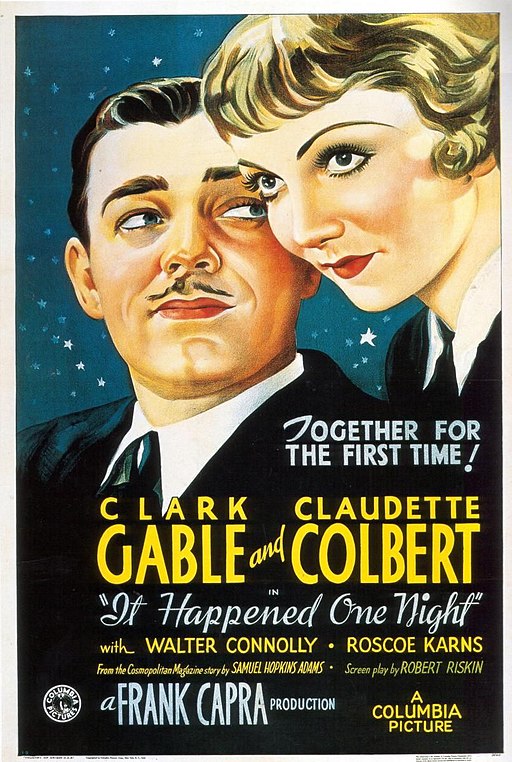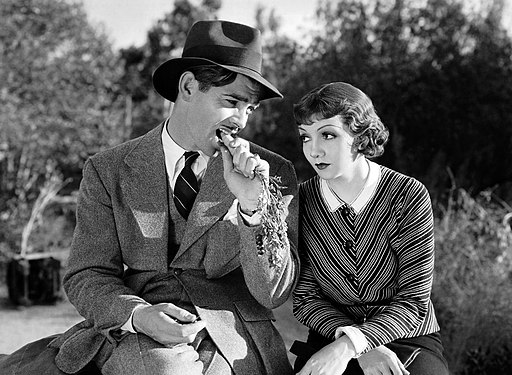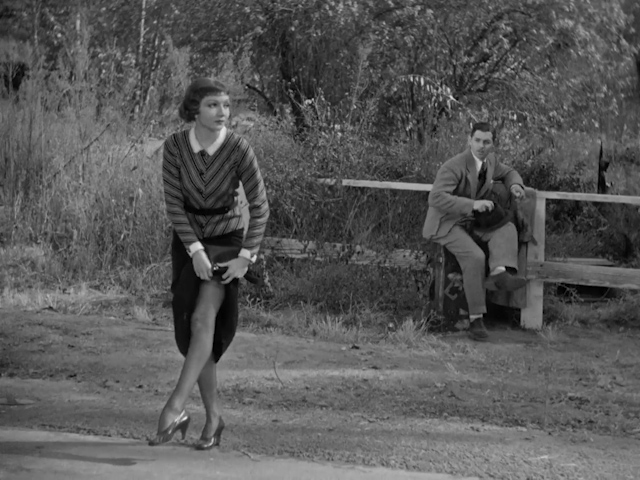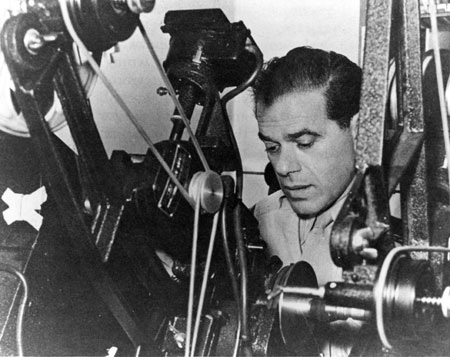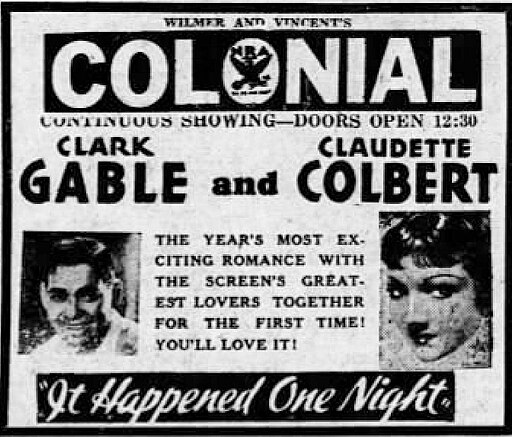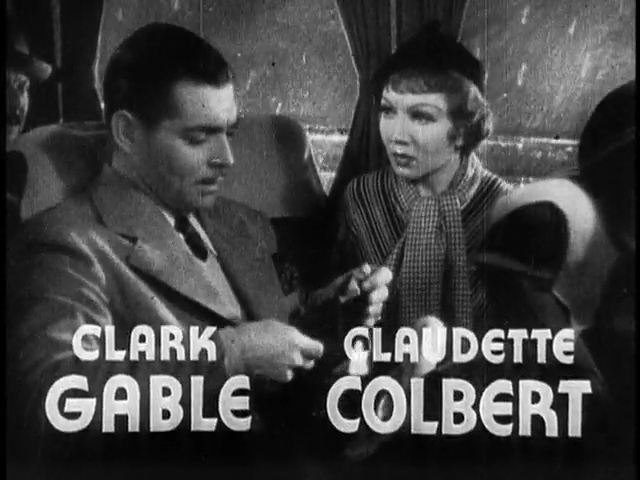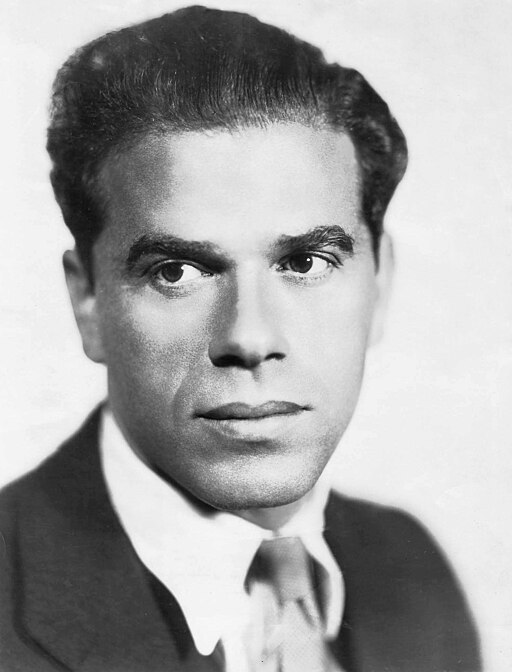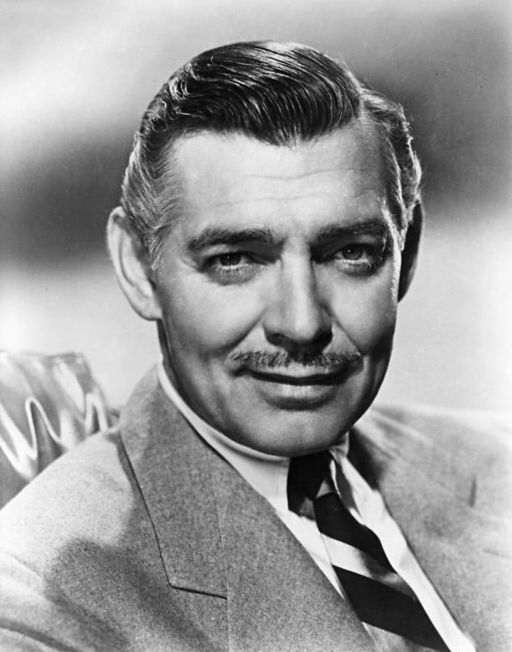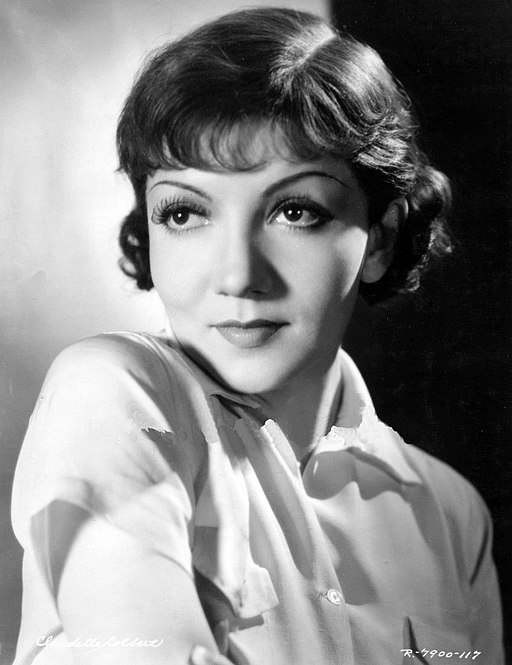It Happened One Night - 1934
back| Released by | Columbia Pictures |
| Director | Frank Capra |
| Producer | Frank Capra (uncredited), Harry Cohn |
| Script | Screenplay by Robert Riskin, based on a short story |
| Cinematography | Joseph Walker |
| Music by | Howard Jackson (uncredited), Louis Silvers (uncredited) |
| Running time | 105 minutes |
| Film budget | $325,000 |
| Box office sales | $2.5 million (during its initial release) |
| Main cast | Clark Gable - Claudette Colbert - Walter Connoly - Roscoe Karns - Jameson Thomas |
It Happened One Night
The First Film Ever to Win All Five Major Academy Awards
"It Happened One Night" is a romantic comedy and a landmark in the genre. The story follows a spoiled heiress (Claudette Colbert) running away from her family and a roguish reporter (Clark Gable) seeking a big story. Their journey on a night bus leads to a series of comedic situations and eventually blossoms into romance. The film is famous for its witty dialogue, charismatic performances, and engaging plot.
One of the first films to win the "Big Five" Academy Awards (Best Picture, Director, Actor, Actress, and Screenplay), "It Happened One Night" established Frank Capra as a top director and boosted the careers of Gable and Colbert. Its success is credited with elevating Columbia Pictures to the rank of major studios in Hollywood. The film also had a significant cultural impact, influencing fashion trends and public behavior, notably in the scene where Gable undresses for bed, revealing he is not wearing an undershirt, which reportedly led to a decline in undershirt sales.
"It Happened One Night" remains a beloved classic for its charm, humor, and enduring appeal in the romantic comedy genre.
Related
It Happened One Night
Overview and Analysis
"It Happened One Night" (1934), directed by Frank Capra, is a seminal film in the romantic comedy genre, known for its witty dialogue, charismatic performances, and engaging narrative. Here's a full analysis of the movie:
Narrative and Plot:
- Structure and Pace: The film follows a linear narrative with a fast pace, characteristic of comedies of the era. It's structured around the journey of the two main characters, Ellie and Peter, their evolving relationship, and the comedic situations they encounter.
- Romantic Comedy Blueprint: The plot serves as an early blueprint for the 'opposites attract' trope in romantic comedies. The story progresses from initial antagonism to mutual respect and eventually to love, all while navigating a series of misadventures.
Themes:
- Class and Social Commentary: The film touches upon themes of class differences and societal norms. Ellie's journey represents a rebellion against the restrictive upper-class lifestyle, while Peter embodies the pragmatic, worldly-wise everyman.
- Independence and Empowerment: Ellie's character arc from a sheltered heiress to a self-reliant individual reflects themes of independence and empowerment, particularly resonant during the Depression era.
- Love and Vulnerability: The film explores the vulnerabilities of falling in love, especially seen in the barriers both Ellie and Peter put up and eventually break down.
Characterization:
- Ellie Andrews (Claudette Colbert): Colbert's performance is spirited, combining elegance with a rebellious streak. She brings depth to Ellie, portraying her as both headstrong and vulnerable.
- Peter Warne (Clark Gable): Gable’s portrayal of Peter is charismatic and witty. His character is rough around the edges but ultimately honorable and kind-hearted.
- Chemistry Between Leads: The chemistry between Gable and Colbert is central to the film’s success. Their timing and interplay elevate the script, delivering both comedic and tender moments convincingly.
Cinematography and Visual Style:
- Visual Comedy: The cinematography by Joseph Walker effectively uses visual gags and physical comedy, integral to the film's humor.
- Iconic Scenes: Certain scenes, like the "Walls of Jericho" or the hitchhiking sequence, are visually memorable and have become iconic in film history.
Direction:
- Frank Capra’s Style: Capra directs with a light touch, focusing on character interactions and narrative over visual spectacle. His direction brings out the best in the actors and keeps the story engaging and fluid.
- Balancing Tone: Capra masterfully balances the comedic elements with the film's more poignant moments, creating a cohesive and heartwarming story.
Cultural Impact and Legacy:
- Defining the Genre: "It Happened One Night" laid the groundwork for romantic comedies that followed. Its blend of humor, romance, and social commentary set a template for the genre.
- Awards and Recognition: As the first film to win the "Big Five" Oscars, its critical acclaim helped elevate Columbia Pictures and solidified Capra’s reputation.
- Influence on Society and Cinema: The film’s impact extended beyond cinema, influencing fashion trends and societal attitudes, particularly with its portrayal of a strong, independent female lead.
Full Cast of “It Happened One Night”:
- Clark Gable as Peter Warne
- Claudette Colbert as Ellie Andrews
- Walter Connolly as Alexander Andrews
- Roscoe Karns as Oscar Shapeley
- Jameson Thomas as King Westley
- Alan Hale as Danker
- Arthur Hoyt as Zeke
- Blanche Friderici as Zeke's Wife
- Charles C. Wilson as Joe Gordon
- Ernie Adams as Bus Driver
- Jessie Arnold as Bus Passenger
- Irving Bacon as Gas Station Attendant
- William Bailey as Bus Passenger
- Ward Bond as Bus Driver #2
- Don Brodie as Gordon's Assistant
- George P. Breakston as Boy
- Bess Flowers as Agnes, Gordon's Secretary
- Joseph Crehan as Policeman
- Mickey Daniels as Bus Passenger
- Harry Holman as Mr. Dykes
Analysis of the direction of Frank Capra:
Frank Capra's direction of "It Happened One Night" is a quintessential example of his ability to blend humor, romance, and social commentary into a cohesive and entertaining narrative. Here's an analysis of his directorial approach in this classic film:
Mastery of Storytelling:
- Capra excelled in storytelling that was both simple and profound. In "It Happened One Night," he crafted a narrative that was straightforward yet layered with themes of class, love, and personal freedom. His direction ensured that the story was accessible and engaging to a wide audience.
Character Development:
- A key aspect of Capra's direction was his focus on character development. He allowed the characters of Peter Warne (Clark Gable) and Ellie Andrews (Claudette Colbert) to evolve naturally over the course of the film. Their transformation from initial antagonism to mutual respect and affection is believable and well-paced, thanks to Capra’s nuanced approach.
Comic Timing and Pacing:
- Capra’s sense of comic timing was impeccable. He expertly balanced the comedic elements with the film's more poignant moments. This blend of humor and heart is a hallmark of his style and is evident throughout "It Happened One Night."
- The pacing of the film is masterful, with each scene contributing to the advancement of the plot or the development of the characters, ensuring that the audience’s engagement never wanes.
Use of Cinematic Techniques:
- While Capra's films are not typically known for their technical innovation, his use of cinematography in "It Happened One Night" effectively complemented the narrative. He utilized close-ups and two-shots to emphasize the growing intimacy between the lead characters.
- The film’s famous “Walls of Jericho” scene is a prime example of Capra’s ability to convey romantic and sexual tension without crossing the boundaries set by the era's production codes.
Balancing Romance and Realism:
- Capra managed to create a romantic story that also felt grounded in reality. The characters and their situations, though often comedic, were relatable and authentic. This balance is a key reason why the film has endured as a romantic comedy classic.
Impact on the Genre:
- "It Happened One Night" is often considered one of the first screwball comedies, a genre that would become incredibly popular in the 1930s and 1940s. Capra’s approach to the film set the standard for many romantic comedies that followed.
In summary, Frank Capra's direction in "It Happened One Night" showcases his talent for creating films that are both entertaining and insightful. His ability to draw out compelling performances from his actors, combined with his skill in balancing different elements of storytelling, results in a film that is both a critical and commercial success. "It Happened One Night" stands as a testament to Capra’s enduring impact on cinema, particularly in the realm of romantic comedy.
Analysis of Clark Gable’s performance as Peter Warne:
Clark Gable's performance as Peter Warne in "It Happened One Night" is widely regarded as a benchmark in the romantic comedy genre. His portrayal of the character offers a blend of charm, wit, and depth that significantly contributes to the film's enduring appeal. Here's an analysis of his role:
Charm and Charisma:
- Gable's natural charisma shines through in his portrayal of Peter Warne, a confident and somewhat cynical newspaper reporter. His charismatic screen presence is pivotal in making the character likable and engaging, despite Peter's initial brusqueness.
Chemistry with Claudette Colbert:
- A key aspect of Gable's performance is his chemistry with co-star Claudette Colbert, who plays Ellie Andrews. Their interactions are filled with witty banter and a palpable tension that evolves into a genuine connection. Gable's ability to spar verbally with Colbert adds a dynamic energy to their scenes together.
Comic Timing:
- Gable demonstrates excellent comic timing, delivering lines with a sense of ease and naturalism that contributes to the film's humor. His portrayal of Peter's sardonic wit is balanced with moments of sincerity, showcasing his versatility as an actor.
Depth and Vulnerability:
- Beyond the humor, Gable infuses Peter with a sense of depth and vulnerability. His character is not just a suave reporter; he reveals layers of sensitivity, particularly in scenes where he expresses care and concern for Ellie. Gable's performance subtly conveys Peter's transformation as he falls in love with Ellie, moving from a self-assured lone wolf to a man openly acknowledging his feelings.
Physicality:
- Gable's physical presence and body language contribute significantly to the character. Whether it's his nonchalant leaning against a doorframe or his relaxed demeanor on the bus, Gable uses his physicality to express Peter's confidence and charm.
Impact on Gable’s Career:
- His role in "It Happened One Night" was somewhat against type for Gable, known primarily for more serious and dramatic roles. The success of the film demonstrated his versatility and helped solidify his status as a leading man in Hollywood.
In summary, Clark Gable's portrayal of Peter Warne is a standout performance that combines charm, wit, and depth. His ability to deliver a character that is both charismatic and complex is a key element of "It Happened One Night's" success and enduring legacy in the romantic comedy genre.
Analysis of Claudette Colbert’s performance:
Claudette Colbert's portrayal of Ellie Andrews in "It Happened One Night" is a standout performance that combines wit, charm, and depth, contributing significantly to the film's success and enduring appeal. Here’s an analysis of her role:
Character Depth and Complexity:
- Strong Female Protagonist: Colbert's Ellie is a strong and independent character, a departure from the typical damsel-in-distress trope of the era. She's a wealthy heiress who, despite her privileged background, is determined to break free from her father's control and assert her independence.
- Vulnerability and Resilience: Colbert skillfully balances Ellie's vulnerability with her resilience. Throughout their journey, Ellie experiences various setbacks and challenges, yet she remains determined and resourceful. Colbert portrays these dual aspects of Ellie’s character with a natural ease, making her both relatable and admirable.
Chemistry with Clark Gable:
- Romantic Tension: The chemistry between Colbert and Clark Gable is central to the film's charm. Colbert's interactions with Gable's character, Peter Warne, are filled with playful banter and a growing romantic tension. She delivers her lines with a perfect mix of sarcasm, humor, and sincerity, which complements Gable’s more straightforward style.
- Evolution of Relationship: Colbert convincingly portrays Ellie’s gradual shift from annoyance to affection towards Peter. Her performance captures the subtleties of this transition, reflecting the complexities of developing love.
Comic Timing:
- Witty and Spirited: Colbert’s comic timing is impeccable. Her portrayal of Ellie’s wit and spirited nature contributes significantly to the film’s humor. She handles the comedic elements with a light touch, ensuring that her character never becomes a caricature.
Empathy and Relatability:
- Connection with the Audience: Colbert's Ellie is not just a runaway heiress; she’s a woman on a quest for autonomy and love. Colbert’s performance makes Ellie a character that audiences can empathize with and root for. Her portrayal transcends the social divide, making Ellie's struggles and desires universally relatable.
Impact on the Genre:
- Defining the Romantic Comedy Heroine: Colbert’s role in "It Happened One Night" helped define the archetype of the romantic comedy heroine. Her blend of independence, wit, and charm would become a blueprint for female leads in the genre.
In summary, Claudette Colbert’s portrayal of Ellie Andrews is a masterful blend of strength, vulnerability, and humor. She brings depth and dimension to the character, making Ellie not only the heart of the story but also a groundbreaking figure in the landscape of romantic comedies. Her performance is pivotal in making "It Happened One Night" a classic, contributing to its humor, emotional depth, and enduring popularity.
Remarkable Quotes from “It Happened One Night”:
- Peter Warne (Clark Gable): "Perhaps you're interested in how a man undresses. You know, it's a funny thing about that. Quite a study in psychology."
- Ellie Andrews (Claudette Colbert): "You've got to get me out of here. I'm going to lose my mind if I stay in this joint another night."
- Peter: "I never did like the idea of sitting on newspapers. I did it once and all the headlines came off on my white pants. On the level, it actually happened. Nobody bought a newspaper that day. They just followed me around and read the news off the seat of my pants."
- Ellie: "Your ego is absolutely colossal." Peter: "Yeah, yeah, not bad, how's yours?"
- Peter: "Now that's my whole plan. I'm going to put up a rope, and I'll sleep on one side and you'll sleep on the other. And if you don't like it, you're welcome to sleep in the trees outside. Just like a squirrel."
- Ellie: "Have you ever been in love, Peter?" Peter: "Me?" Ellie: "Yes. Haven't you ever thought about it at all? It seems to me you, you could make some girl wonderfully happy."
- Peter: "I asked you a simple question! Do you love him?" Ellie: "Yes! But don't hold that against me, I'm a little screwy myself!"
- Peter: "I'm the whippoorwill that cries in the night. I'm the soft morning breeze that caresses your lovely face."
Awards and Nominations:
"It Happened One Night," directed by Frank Capra, achieved an extraordinary feat in the world of cinema, particularly at the Academy Awards. Here’s an overview of its accolades:
Academy Awards (1935):
- Best Picture: Won
- Best Director (Frank Capra): Won
- Best Actor (Clark Gable): Won
- Best Actress (Claudette Colbert): Won
- Best Writing, Adaptation (Robert Riskin): Won
Other Recognitions:
- While the primary recognition for "It Happened One Night" came from the Academy Awards, its impact extended far beyond these achievements. The film did not garner nominations in major international ceremonies like the BAFTA Awards or the Cannes Film Festival at the time. However, its success at the Oscars was groundbreaking.
"It Happened One Night" was the first film ever to win all five major Academy Awards (Best Picture, Director, Actor, Actress, and Screenplay), a remarkable achievement that has only been matched by two other films in history. This sweep was a testament to the film’s quality, its impact on audiences and critics, and its place in cinematic history. The film’s success helped elevate Columbia Pictures from a minor studio to a major player in Hollywood and cemented Frank Capra’s status as a leading director in the industry.

